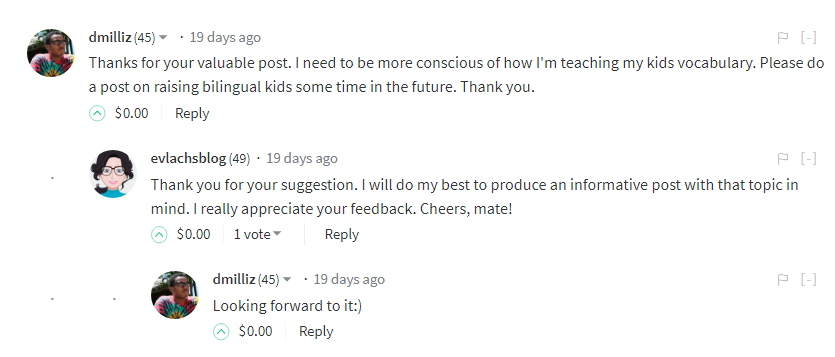I asked my mother-in-law how her children became fluent in both English and Greek since Greek has always been the language spoken at home. She said that all her children learnt English from school, being away from home every day for 6-8 hours. They had no choice but learn to speak English. She could remember that her son (my husband) could not speak English at all when he first entered kindergarten. He used to cry all the time because he did not want to come to school. Nobody could understand him so he found it hard to establish friendships with other children. He learnt to speak and understand English eventually as days went by and has remained fluent in Greek. My mother-in-law also learnt English through communicating with her children, as well as customers from their shop.
As for me, Filipino is my first language and it was the language spoken at home. I learnt English at school or mostly by self-taught through reading and watching American TV shows and movies. I'm thinking, and I also said this to my husband, that if ever we will have a child of our own in the future, I would want our child to learn to speak and understand Greek and Filipino fluently. I strongly believe that a language is one of the important cultural factors that determine one's identity and I want my child to embrace his or her roots, heritage, and identity.
According to Dr. Eisenchlas (2016), there are two main models for raising bilingual children.
Option 1: One person-one language
This model might be helpful for me and my husband since we both speak different first languages. Because we want our child to learn both Greek and Filipino, we will have to speak our native language to our child at home. Our child will also learn to use English at school and in the community. Our primary reason for teaching our child our own language is not to have "secret conversations" with our child so that the other parent will not be able to understand what is being talked about but to help both of us connect with our child in our own languages. It is, therefore, necessary for both of us to learn each other's languages so neither of us will feel left out when we speak our own language to our child.
I have actually taken this action since I have met my husband. Since I am a lover of language, I have endeavoured to learn Greek myself, and now I am able to pick up some of the words in Greek, and I can also read and write in Greek, although not fluently yet.
Option 2: Minority language pattern
"the minority language model means that your children hear, speak and use your native language a lot at home, because you and your partner are using it."
If you and your partner speak the same first language, then this model might be helpful for you.
Recently, I asked some of the parents at our Early Learning Centre who migrated from India about the level of English that they speak with the children at home. The parents are confident that their children will learn English at school since they will be forced to communicate in English with their peers and teachers. At home, the parents speak Hindi to their children, because they do not want them to grow up not speaking their native language.
But guess what, 100% of Filipino students at our school, unfortunately, cannot speak or even understand our Filipino language, which is a shame. I hope this is not the case for all other Filipino families in Australia. I will want my child to learn Filipino, because as I have said earlier, I do not want him or her to lose his/her heritage and identity, just the same way that I want my child to learn the Greek language, too.
How can you support your bilingual (or multilingual) child effectively?
Start with the basics. Almost everything around us is countable. So teach your child the numbers in your native language, the same way that you teach him/her the numbers in English. You may also teach your child the things he/she can find in his/her home or in the community in your language.
Immerse your child in your first language by sticking with your language choice at home. Watch programs on TV, sing songs, play, listen to, and dance to music in your native language.
"Children love music, and melody is a great way to help remember things."
Make learning fun and interesting. For example, your child loves the book "The Three Little Pigs." You could find a version of this book in your first language, and read the story to your child. Encourage your child to join in, and if you're up to it, use dress-ups and puppets and re-enact the scenes from the book with your child.
Play games. "I Spy" is a great game to refer to objects in your native language, and your child will be able to familiarise with the terms in that language.
Enrol your child in schools or child care centres that support your child's use of your native language.
Give your child plenty of opportunities to listen to and speak your native language. If your child doesn't respond to you using your language, don't give up. You can respond to your child in your language, too, to acknowledge that you understand him/her. Just hearing you speak your language will eventually help him/her learn it.
Eisenchlas, S . (2016). Raising Bilingual Children. Retrieved from http://raisingchildren.net.au/articles/bilingual_children.html

Shoutout to @dmilliz, as per your request. I hope I am able to help you with this post. Thank you for your suggestion.




Click the link to join our Discord and meet our absolutely awesome founder, @dynamicgreentk.
Banners credit to @baa.steemit.
Banners credit to @baa.steemit.
Join @ntowl 's writing class on DynamicSteemians Discord channel and learn more about producing quality content material. You may also be up for a challenge. Check her post: Ready to be brave, face the fire, and be famous? You might earn 2 SBI shares too!
"I'm on a mission to help more people become better bloggers, create quality content, and be successful on Steemit. And sometimes the best way to do that is by example." ~@ntowl
So, come and join, and be inspired!!!
Check out posts by: @sarahdandridge, @ryl, @dangerousangel, @socialreformer,
@puregrace, @pkalra, @honeychum, @chireerocks, @udywriter,
@shanu, @lantracy, @emilyandy, @bunnychum
Vote @yabapmatt, @utopian-io, @ausbitbank, @steemed, @patrice, @themarkymark, @justyy @ocd-witness, @steemgigs (@surpassinggoogle), @hr1, @cloh76.witness, @blocktrades, @mahdiyari, @curie, @emrebeyler, @liberosist and @pharesim as witnesses to let them know you support their work!



